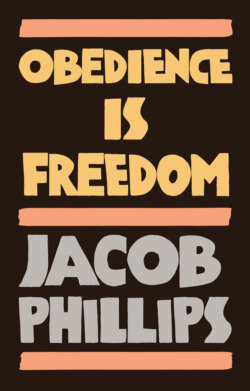Obedience is Freedom

Реклама. ООО «ЛитРес», ИНН: 7719571260.
Оглавление
Jacob Phillips. Obedience is Freedom
CONTENTS
Guide
Pages
Obedience is Freedom
Introduction
1 Allegiance
Notes
2 Loyalty
Notes
3 Deference
Notes
4 Honour
Notes
5 Obligation
Notes
6 Respect
Notes
7 Responsibility
Notes
8 Discipline
Notes
9 Duty
Notes
10 Authority
Notes
Index. A
B
C
D
E
F
G
H
J
K
L
M
N
O
P
R
S
T
W
POLITY END USER LICENSE AGREEMENT
Отрывок из книги
Jacob Phillips
Having outlined the basic position in the Introduction, such readers might expect the chapters to outline, in prosaic terms, exactly how the themes under discussion contribute to that more authentic freedom lacking in today’s world. These would then begin with comments on the etymology of the chapter heading. These terms often combine elements of restraint or obedience with expressions of spontaneity or freedom. The word obligation, for example, derives from the past-participle stem of the verb obligare, meaning ‘to bind’, and yet also from the noun obligatio, which is connected with expressing gratitude; hence the old English phrase ‘much obliged’. From findings such as these, some discussion of ancient texts would be expected, particularly those of Greek and Roman philosophy. Then a critical discussion with more contemporary voices could follow, working towards the overarching conclusion that obedience is not only connected with freedom in ways we seem to have forgotten, but that these two are so mutually dependent they are indistinct: hence, obedience is freedom.
.....
Chapter 9, ‘Duty’, continues in a literary vein, bringing the six-volume autofiction work My Struggle by Karl Ove Knausgaard into dialogue with the differing cosmologies of the premodern, modern and postmodern periods. This chapter presents the view that premodern cosmology had a sense of duty ‘hardwired’ into it, not least due to its inherently God-centred structure, which was not entirely forsaken in the modern era. Knausgaard’s work gives voice to premodern and modern impulses, stubbornly resisting the collapse into cosmic nihilism associated with postmodernity – particularly when he is in everyday situations of duty, such as caring for the young.
The book closes in Chapter 10 with a theme that surely sums up all those covered thus far: ‘Authority’. This broken binary is perhaps the most important in showing how obedience perpetuates freedom, the degree to which it is indistinguishable from it, and vice versa. What many consider obedience today is just blind subjection, which is why there is some truth behind contemporary unease about the term. Similarly, what many people consider authority today is just an exertion of power, which supervenes over assent, again helping to explain why it has become a debased term. This chapter seeks to show that genuine obedience always involves a measure of assent and the genuine expression of authority has no need for the exertion of the power. However difficult it is for us to envisage this now, the interrelation of obedience and authority once stemmed from self-evidence, from the unquestioned conviction that those in authority were mandated to their position. Today’s various ‘contractual’ forms of obedience effectively undermine authority and tend to get ensnared in individual desires, as indeed authority founded on just brute force undermines obedience and tends to unleash chaos.
.....